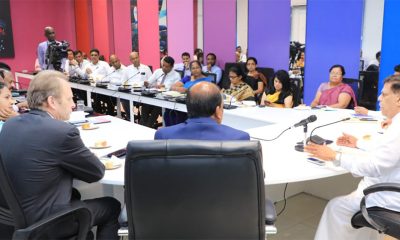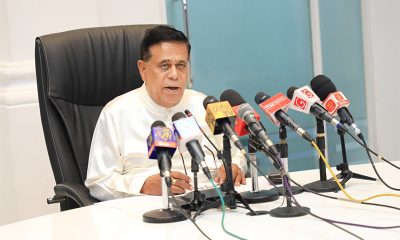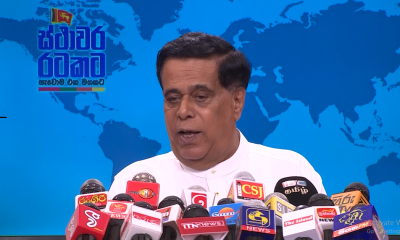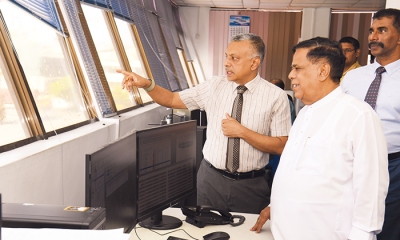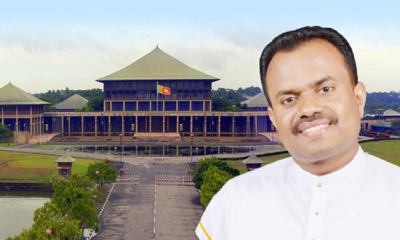Business
‘The lack of a proper management system hindering SL’s port efficiency’
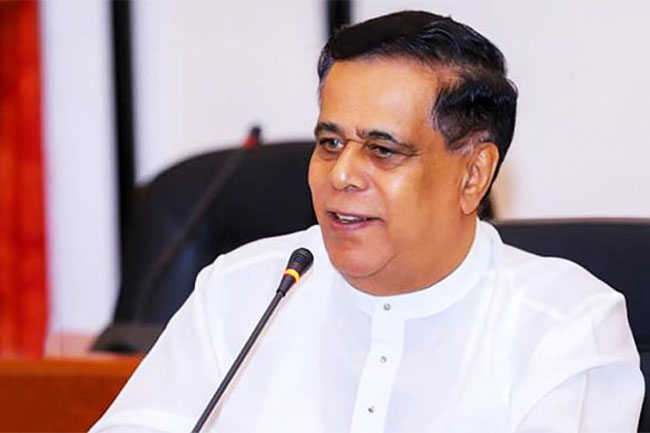
By Hiran H. Senewiratne
Sri Lanka does not have a proper port management system and this drawback causes tremendous delays when dealing with documentation. It will not serve the purpose even if the government expands port operations, Minister of Ports, Shipping and Aviation Nimal Siripala de Silva said.
“The government should not regulate the shipping industry but on certain occasions act as a regulator in order to protect the interests of the people. Streamlining the port management system will enable us to create an efficient port. Once the IMF agreement is signed we could develop the shipping industry with assistance from the private sector, De Silva said at the Sixth Annual General Meeting of the Sri Lanka Association of NVOCC Agents (SLANA). The event was held at the Cinnamon Grand on Monday.
De Silva added: ‘Colombo Port has no room for any expansion but the Asian Development Bank is planning to fund the North Port development project and the final feasibility report will be ready soon. Therefore, the private sector could take a leading role in its development activities.
‘Once the IMF agreement is signed we could get more funds for the development of the country. Initially Galle Port will be developed as a tourism and passenger hub in the country. Apart from that, Japan one of our main donor countries, has supported us with US $ 1 billion to set up a night vision system in Trincomalee Port.
‘A large number of investment opportunities are available in the Trincomalee area, especially to set up an LPG gas terminal. Other investments will flow into Sri Lanka once the IMF agreement is signed.
‘Further, the Indian government will invest US$ 50 million to build the break water system and develop other facilities at Kankesanthurai Port. Once the IMF agreement is signed, foreign funds will come into Sri Lanka, which would enable us to develop the country in a systematic manner.’
SLANA was formed to promote and protect the interests of NVOCC agents in Sri Lanka and to formulate national policies to elevate the maritime industry, together with the Ministry of Ports & Shipping. SLANA works with the SLPA, Director General of Merchant Shipping & Customs and other trade associations to identify and address issues faced by its members. Currently SLANA membership stands at 52.
SLANA was formed in 2016 by licensed agents in Sri Lanka representing Non-Vessel Operating Container Carriers who operate fleets of marine containers. The principal container fleets include 20ft & 40ft standard dry containers, refrigerated containers, liquid carrying ISO tank containers and dry special containers, such as flat racks & open tops.
The NVOCC membership consists mainly of regional carriers, who operate shipping services within the Indian sub-continent (including Pakistan, Bangladesh, Nepal, Maldives), Middle East Gulf Ports (including, Dubai, Sohar, Shuwaikh, Doha, Bandar Abbas, Umm Qasr) and Far East Ports (including Singapore, Port Klang, Busan, Hai Phong, Taiwan, and Base Ports in China).
Business
Sri Lanka’s economy at a crossroads: Fiscal improvement amid trade and demand woes

Sri Lanka’s fiscal health showed signs of improvement in early 2025, with the budget deficit narrowing to Rs. 86.6 billion in the first two months of the year, down from Rs. 129.3 billion in the same period last year. This was supported by a rise in government revenue and a decline in domestic borrowing, signaling cautious optimism in the country’s economic recovery.
Net domestic financing dropped to Rs. 96.8 billion, a significant reduction from Rs. 144.8 billion in early 2024, while foreign debt repayments continued, albeit at a slower pace. The Treasury bill and bond markets remained stable, with strong investor interest auctions were oversubscribed by 2 to 3 times. Foreign holdings of government securities also saw a slight uptick, reflecting cautious confidence in Sri Lanka’s debt instruments.
Meanwhile, lending rates edged lower, with the Weekly Average Weighted Prime Lending Rate (AWPR) dipping to 8.36%, supporting hopes of easier credit conditions. The stock market also saw modest gains, with the All Share Price Index (ASPI) rising 0.7% by early May.
Deflation persisted but softened in April 2025, with prices declining by 2.0% year-on-year – a slight improvement from previous months.
Food prices rose by 1.3%, while non-food categories continued to see deflation (-3.6%). Core inflation, which excludes volatile items, remained low at 0.8%, suggesting weak underlying demand.
Global oil prices fell amid concerns over slowing growth, particularly due to US trade policies, with Brent crude dropping by over $4 per barrel. However, Sri Lanka’s import costs for crude oil in March 2025 were slightly higher than the previous year, posing a challenge for energy-dependent sectors.
Export earnings grew by 5.3% in the first quarter of 2025, driven by strong performances in textiles, spices, and tea. However, import expenditure surged by 11.1%, led by machinery, oils, and dairy products, widening the trade deficit to $1.54 billion.
The Sri Lankan rupee depreciated by 2.3% against the US dollar this year, though the Central Bank bolstered reserves with 160.8 million in net foreign exchange purchases in April.
Gross official reserves stood at 6.53 billion by end-March, including funds from the PBOC swap arrangement.
While fiscal consolidation and stable debt markets provide some relief, Sri Lanka’s economy faces headwinds from global uncertainties and domestic demand weakness. The easing deflation trend and lower interest rates may support recovery but managing the trade deficit and sustaining export growth remain key challenges. In a broader context, the Central Bank figures depict neither a recession nor a boom. These figures suggest instead an economy grappling with persistent challenges and lacking clear momentum in either direction,” a source told The Island on condition of anonymity.
Reported using data from Central Bank.
By Sanath Nanayakkare
Business
Sri Lanka’s scenic South Coast emerging as a hotspot for digital nomads

WORX Co-Working leading the charge
As remote work continues to reshape global work culture, Sri Lanka’s scenic South Coast is emerging as a hotspot for digital nomads and WORX Co-Working is leading the charge. The country’s largest co-working network has just launched its fifth location, this time in the surfers’ paradise of Midigama, in partnership with Lime & Co Hostel.
Midigama, famed for its world-class reef breaks and laid-back vibe, is attracting a growing wave of long-term travellers and remote professionals.
Recognising this shift, WORX’s latest space blends productivity and leisure, offering high-speed Wi-Fi, 25 workstations, and an on-site Zippi café serving artisanal coffee, all just two minutes from the beach.
“Sri Lanka’s work-travel scene is evolving,” says Azahn Munas, Managing Director of WORX. “By partnering with Lime & Co, we’re creating spaces where professionals can work efficiently while enjoying the surf-and-sunshine lifestyle.”
The Lime & Co-Working space isn’t just about desks; it’s a community hub for workshops, networking, and pop-ups, catering to the booming digital nomad scene in the South. With Mirissa, Weligama, and Ahangama also seeing rising demand, WORX’s expansion signals a broader trend: Sri Lanka is becoming a top destination for location-independent workers.
Business
Belluna Lanka: A silent force behind Sri Lanka’s growth story

For over a decade, Belluna Lanka—the Sri Lankan arm of Japan’s Belluna Co. Ltd. (a Tokyo Stock Exchange-listed giant with 50+ years of global expertise) has been a quiet yet powerful driver of investment in the island nation. With over USD 200 million pumped into the region and the biggest share of it into Sri Lanka, this Japanese-backed firm has shaped luxury hospitality, high-end real estate, and sustainable development, all while staying true to a philosophy of long-term commitment over short-term gains.
Unlike fly-by-night investors, Belluna chose Sri Lanka as its South Asian hub—not just for its natural beauty, but for its untapped potential. Every investment has been self-financed from Japan, avoiding reliance on local debt, a testament to Belluna’s financial strength and faith in Sri Lanka’s future. Belluna’s Signature Projects in Sri lanka are : Granbell Colombo & Le Grand Galle – Luxury hotels blending Japanese precision with Sri Lankan soul., The Westin Maldives (2018) – Proof of Belluna’s regional ambition, managed by Marriott., 447 Luna Tower, Cinnamon Gardens – A haven of unassuming elegance in Colombo’s heart., Prime Colombo 3 Land (Dr. Wijewardene Mawatha) – A future landmark in the making.
“We don’t just build properties—we build legacies,” says Hiroshi Yasuno, Director of Belluna Co. Ltd. “Our projects fuse Japanese sustainability with Sri Lankan warmth, ensuring growth that lasts.”
“As Sri Lanka rebounds, Belluna Lanka remains all in backing the country’s revival with more jobs, smarter infrastructure, and sustainable tourism. This isn’t just business; it’s a partnership for progress”. Yasuno said.
-

 News7 days ago
News7 days agoJapan-funded anti-corruption project launched again
-

 News7 days ago
News7 days agoSethmi Premadasa youngest Sri Lankan to perform at world-renowned Musikverein in Vienna
-

 Sports6 days ago
Sports6 days agoOTRFU Beach Tag Rugby Carnival on 24th May at Port City Colombo
-

 News4 days ago
News4 days agoRanil’s Chief Security Officer transferred to KKS
-

 Business7 days ago
Business7 days agoNational Savings Bank appoints Ajith Akmeemana,Chief Financial Officer
-

 Opinion2 days ago
Opinion2 days agoRemembering Dr. Samuel Mathew: A Heart that Healed Countless Lives
-

 Features5 days ago
Features5 days agoThe Broken Promise of the Lankan Cinema: Asoka & Swarna’s Thrilling-Melodrama – Part IV
-

 Features6 days ago
Features6 days agoTrump tariffs and their effect on world trade and economy with particular





